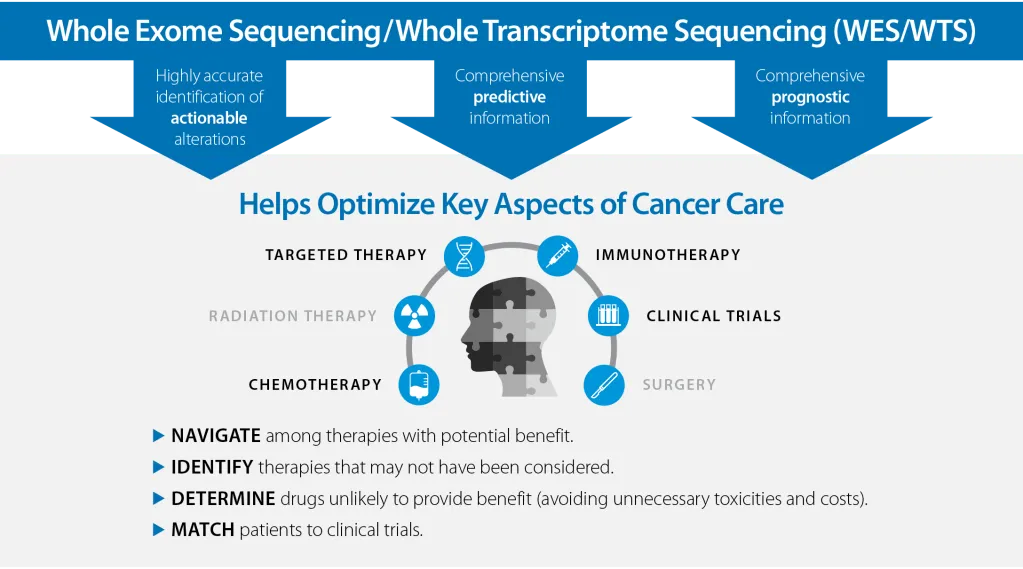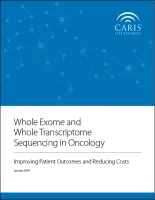
Value of Caris Comprehensive Molecular Profiling
Missing Critical Insights for Tumor Therapy Selection?
Get a more complete picture with Comprehensive Molecular Profiling
In today’s precision-focused oncology practice, traditional molecular profiling methods may not provide a complete picture of a patient’s cancer. Comprehensive molecular profiling (CMP) fills this crucial gap by ensuring you have the most in-depth information at your fingertips in your pursuit of optimal patient care.
Comprehensive Molecular Profiling (CMP)

of alterations are missed by small hotspot panels.1

of patients tested with non-NGS methods had a missed targeted therapy option versus 3% of patients who underwent comprehensive genomic profiling.2
CMP reduces the chance of missing genomic alterations and targeted therapy options.
- Zehir A, Benayed R, Shah RH, et al. Mutational landscape of metastatic cancer revealed from prospective clinical sequencing of 10,000 patients. Nat Med. Jun 2017;23(6):703-713. doi:10.1038/nm.4333
- Paz-Ares L, Gondos A, Saldana D, et al. Genomic testing among patients with newly diagnosed advanced non-small cell lung cancer in the United States: A contemporary clinical practice patterns study. Lung Cancer. 2022/05/01/ 2022;167:41-48. doi:https://doi.org/10.1016/j.lungcan.2022.01.021
Clinical Utility, Now and in the Future
CMP generates a comprehensive roadmap for therapy selection today, while facilitating the future use of newly approved biomarkers and treatments, plus clinical trial enrollment. CMP simplifies and streamlines clinical decision-making, empowering physicians to develop the most informed care plans for patients. By enabling selection of the right therapy from the start, CMP can help improve outcomes while minimizing downstream costs, ineffective therapies, and unnecessary toxicity.

Caris Comprehensive Molecular Profiling
23,000+ genes
Whole exome sequencing (WES-DNA)
Whole transcriptome sequencing (WTS-RNA)
15+ proteins*
PD-L1 (22c3, 28-8, SP142, SP263) by IHC
Her2/Neu by IHC
CLDN18, FOLR1, MMR and other tumor-specific proteins by IHC
Specimen options
Tissue (fresh or PPFE)
Blood* (2 tubes whole blood)
NGS signatures/features
Tissue (gLOH, HRD, MSI, TMB, HLA genotyping)
Blood* (bTMB, MSI, HLA genotyping)
AI signatures*
Caris FOLFIRSTai™ (mCRC cases)
Caris GPSai™ (CUP cases)
Pathogen detection*
Epstein-Barr Virus (EBV)
Merkel Cell Polyomavirus (MCPyV)
Human Papillomvirus (HPV)

TISSUE
DNA
RNA
Protein

BLOOD
Somatic Tumor
Incidental CH
Incidental Germline†
*Not available in all locations.
† Not a replacement for comprehensive germline testing. Incidental pathogenic alterations are reported, including ACMG recognized cancer genes. Negative results do not imply the patient does not harbor a germline mutation.
How can CMP Elevate Your Clinical Care?
By unleashing the full potential of CMP in cancer care, you can ensure no vital information is left undiscovered in your pursuit of improved patient outcomes.
Discover
More
Tune in to the Caris Molecular Minute Podcast Series, led by the Caris Precision Oncology Alliance. Gain valuable insights from today’s foremost oncology experts as they delve into a wide array of leading-edge subjects in precision oncology and the evolution of cancer care.
With each passing day, emerging insights reaffirm the increasing importance of biomarker analysis and tumor profiling in personalized cancer care. Our active involvement in oncology research contributes to a deeper understanding of molecular science, propelling the advancement of precision medicine.

